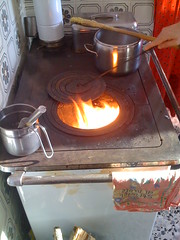In visiting Italy it is impossible not to be awestruck by the rich traditions of art & culture. The awesome basilicas, astonishing art, and amazing cuisine are all impressive in their own right. However, on this visit to Italy I was impacted by a much less romantic aspect of Italian life.
As we mentioned in our previous post, we were very fortunate to experience Italy with our Italian friends Edoardo and Odile. Their families generously opened up their homes to us which offered us an inside perspective on Italian life.
What struck me in observing their household habits was that they are much more resourceful and efficient than we are in America. Here are a few observed examples:
-Transportation: You will find much smaller and much more efficient cars in Italy. This is probably due to two factors. First, the cost of gasoline is the equivalent of approximately $5.55 per gallon (aprox. 1.09 euro per liter). Second, the roads in Italy are much smaller especially in older town centers. Either way, Italians have learned to manage by using smaller cars and by utilizing public transportation.
-Energy: In addition to gasoline household energy is also much more expensive in Italy than in the US. As a result, Italian households are extremely efficient. In fact, on average, Italians consume about 40% of the energy that Americans do.
In all the homes we visited all doors to rooms were kept shut (to keep heat in the room) and lights were only used in areas which were occupied. Furthermore, only rooms that were lived in were heated.
To save money, both Odile’s & Edoardo’s parents used wood instead of electricity or natural gas to heat their homes. Edoardo’s mom even used wood for her stovetop to prepare food (which also provided heat for the kitchen).
In talking with Odile’s father he pointed out that local residential building codes were recently updated to require new homes to be built with double walls for insulation as well as solar panels for energy generation. In fact, Edoardo’s father showed me the controls to their solar panel which was used to heat their hot water tank.
-Food: In sharing meals with Edoardo & Odile’s family we witnessed a meal with very little waste. For example, Odile’s mother made us homemade vegetable soup. In describing how she prepared the soup she told us that she puréed the vegetables and kept the leftover solid matter to make a vegetable broth for future use (in our household we would have likely thrown the leftover solid matter in the trash).
In having dinner with Edoardo’s family we found that virtually all the leftover food from our meal was saved for composting to use in their garden (which was the source of many of the tasty dishes on the table). One notable exception was the sausage lining which was saved to feed their cat.
In summary, Italians have successfully managed to deal with higher prices for gas, energy, and consumption by cutting back without sacrificing quality of life. I hope to retain these lessons for my life back home. Grazi Italy.
